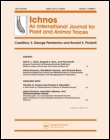
ICHNOS-AN INTERNATIONAL JOURNAL FOR PLANT AND ANIMAL TRACES
Scope & Guideline
Illuminating Evolution: Where Fossils Tell Their Stories
Introduction
Aims and Scopes
- Ichnology and Trace Fossils:
The primary aim of the journal is to explore trace fossils, which are geological records of biological activity. This includes the study of ichnotaxa, their classification, and their significance in paleoecological and paleoenvironmental contexts. - Paleoenvironmental Reconstructions:
Research often emphasizes the use of trace fossils to reconstruct ancient environments, understanding how organisms interacted with their habitats, and the implications for sedimentological processes. - Methodological Innovations:
The journal highlights novel methodologies in ichnological research, including advanced imaging techniques such as X-ray micro-CT, which enhance the quantitative analysis of trace fossils and their structures. - Bioturbation and Sediment Dynamics:
A consistent focus is placed on bioturbation and its effects on sediment properties such as porosity and permeability, which are crucial for understanding reservoir characteristics in geosciences. - Interdisciplinary Approaches:
The journal encourages interdisciplinary studies that integrate ichnology with other fields such as ecology, geology, and paleontology, fostering a comprehensive understanding of trace fossil significance.
Trending and Emerging
- Quantitative Ichnology:
There is a noticeable increase in quantitative studies that utilize advanced imaging technologies to analyze trace fossils. This trend indicates a shift towards more rigorous and reproducible methodologies in ichnological research. - Paleoecological and Taphonomic Insights:
Emerging themes focus on the taphonomic processes that affect trace fossils and their interpretation within paleoecological contexts. This highlights a growing interest in how biological and environmental factors influence fossilization. - Interdisciplinary Studies:
A trend towards interdisciplinary research is becoming evident, with studies integrating ichnology with modern ecological principles and sedimentological processes, enhancing the relevance of ichnofossils in contemporary science. - Neoichnology and Experimental Approaches:
There is a rising interest in neoichnology, which involves studying modern organisms to infer past behaviors and ecological interactions. This experimental approach is gaining popularity for its potential to provide insights into ancient life. - Environmental Change Indicators:
Research increasingly emphasizes the role of trace fossils as indicators of past environmental changes and climatic events, reflecting a broader ecological perspective on ichnology.
Declining or Waning
- Traditional Taxonomic Studies:
There seems to be a waning interest in purely taxonomic studies without broader ecological or environmental implications, as newer publications increasingly emphasize functional and contextual analyses of ichnofossils. - Localized Studies with Limited Scope:
Research focusing solely on localized ichnological findings without broader implications or comparisons to global ichnofossil records is becoming less frequent, indicating a shift towards more integrative studies. - Historical Perspectives in Isolation:
While historical perspectives are valuable, there appears to be a reduction in papers solely dedicated to historical accountings of ichnological figures or events without accompanying new findings or methodologies.
Similar Journals

BULLETIN OF THE GEOLOGICAL SOCIETY OF DENMARK
Advancing Geological Knowledge for a Sustainable FutureBULLETIN OF THE GEOLOGICAL SOCIETY OF DENMARK, published by the Geological Society of Denmark, serves as a key platform for the dissemination of original research and comprehensive reviews related to geological studies in Denmark and beyond. With an ISSN of 2245-7070, this journal provides a significant avenue for sharing findings that contribute to our understanding of geological processes, resources, and the history of the Earth. Although it operates under traditional access options, the journal encourages a rich scholarly dialogue among researchers, professionals, and students alike. Its impact is evident in the broad scope it covers, catering to diverse areas of geology, including but not limited to sedimentology, paleontology, and environmental geology. By fostering an environment of knowledge sharing, the BULLETIN OF THE GEOLOGICAL SOCIETY OF DENMARK is not just a journal; it is a vital resource for anyone invested in advancing geological science.
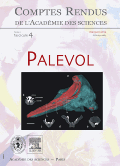
COMPTES RENDUS PALEVOL
Unearthing Earth's Secrets, One Article at a TimeCOMPTES RENDUS PALEVOL, published by ACAD SCIENCES in France, stands as a pivotal journal in the field of paleontology. With an ISSN of 1631-0683 and an E-ISSN of 1777-571X, this esteemed publication provides a platform for innovative research and scholarly discourse, contributing significantly to the understanding of Earth's biological history. Having achieved a commendable Q2 rank in the 2023 Paleontology category and positioned at Rank #63 out of 113 in the Scopus Earth and Planetary Sciences segment, it underscores its relevance and influence in the scientific community. The journal's converged years from 2002 to 2024 reflect a commitment to ongoing research and knowledge dissemination. Although currently lacking open access options, the journal's rigorous peer-review process ensures the integrity and quality of published articles, making it an essential resource for researchers, professionals, and students striving to explore and expand their expertise in paleontological sciences.

Palaeoworld
Uncovering the Secrets of Life Through TimePalaeoworld is a leading peer-reviewed journal published by ELSEVIER, focusing on the dynamic and interdisciplinary fields of paleontology, ecology, and stratigraphy. Established in 2006, the journal aims to facilitate the dissemination of innovative research and significant discoveries that enhance our understanding of past life on Earth. With an impressive impact factor and categorized in the second quartile (Q2) for Ecology, Evolution, Behavior and Systematics, Paleontology, and Stratigraphy in 2023, Palaeoworld stands out in its commitment to high-quality scholarship. The journal is indexed in Scopus, ranking #23 in Paleontology and #14 in Stratigraphy, placing it within the top 20% of publications in these categories. As a valuable resource for researchers, professionals, and students alike, it provides unrestricted access to cutting-edge findings, detailed methodologies, and critical assessments of paleo-environmental data. This journal is not only a repository of knowledge but also a platform for advancing discussions that bridge past ecological patterns with contemporary issues.
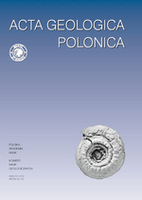
ACTA GEOLOGICA POLONICA
Transforming geological discussions into impactful knowledge.ACTA GEOLOGICA POLONICA is a distinguished journal published by the Polska Akademia Nauk, in collaboration with the University of Warsaw's Geology Department. Since its inception, it has served as a vital platform for disseminating innovative research in the field of Geology, reflecting a commitment to advancing scientific knowledge in Earth and planetary sciences. With an ISSN of 0001-5709 and an E-ISSN of 2300-1887, this journal provides a rigorous review process and is classified in the Q3 quartile for Geology as of 2023, indicating its growing influence in the discipline. Despite not being open access, the journal facilitates meaningful contributions that span a range of geological topics from fundamental research to applied sciences, thereby enriching the academic landscape. Researchers, professionals, and students alike are encouraged to engage with the valuable findings and discussions contained within its pages, which continue to shape the future of geological inquiry.
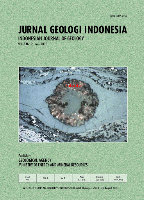
Indonesian Journal of Geoscience
Innovating Earth Sciences: Bridging Knowledge and Community.Indonesian Journal of Geoscience, published by the GEOLOGICAL AGENCY, is a vital platform for sharing cutting-edge research in the field of Earth and Planetary Sciences. With an ISSN of 2355-9314 and E-ISSN of 2355-9306, this open-access journal has been making significant contributions to the geoscientific community since its establishment in 2013. Operating out of Bandung, Indonesia, the journal is dedicated to disseminating high-quality research across diverse areas, making it an essential resource for researchers, professionals, and students alike. Recognized in the 2023 Q2 category in Earth and Planetary Sciences, it currently ranks #134/195 among general Earth and Planetary Sciences journals in Scopus, reflecting its growing prominence and academic rigor. The journal seeks to foster scientific discussions by publishing original research, reviews, and case studies that address contemporary challenges and advancements in geoscience, thus contributing to a deeper understanding of our planet. With its commitment to open access, the Indonesian Journal of Geoscience ensures that vital research is accessible to a global audience, encouraging collaboration and innovation in the field.
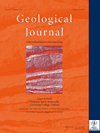
GEOLOGICAL JOURNAL
Illuminating the path of geological research for over seven decades.GEOLOGICAL JOURNAL, an esteemed publication by WILEY, has been at the forefront of geological research since its inception in 1951. With an ISSN of 0072-1050 and E-ISSN of 1099-1034, this journal serves as a vital platform for disseminating high-quality, peer-reviewed research in the field of geology. Operating out of the United Kingdom, the journal proudly features a Scopus rank of 80 out of 321 in the Earth and Planetary Sciences category, reflecting its commitment to scholarly excellence, with a 2023 category quartile ranking of Q2. As part of its innovative approach, GEOLOGICAL JOURNAL seeks to foster interdisciplinary collaborations, advancing our understanding of earth processes, materials, and history. Although it does not offer open access options, its robust subscription model ensures that both professionals and students have access to groundbreaking insights. With a publication history that spans over seven decades, the GEOLOGICAL JOURNAL continues to be an indispensable resource for the global geological community, encouraging discoveries that shape our comprehension of the planet.
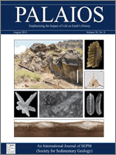
PALAIOS
Discovering Insights from Fossils and StratigraphyPALAIOS is a renowned journal published by the SEPM-Society for Sedimentary Geology, focusing on the interdisciplinary fields of paleontology and sedimentary geology. Established in 1986, this scholarly publication serves as a vital platform for disseminating innovative research and insightful reviews that bridge ecological and evolutionary aspects with paleontological studies. With an impressive track record, the journal has achieved a commendable impact factor and consistently holds a Q2 ranking in both Ecology, Evolution, Behavior and Systematics and Paleontology as of 2023. Researchers and professionals will benefit from the diverse range of studies presented, which encompass fossil analysis, stratigraphy, and the impacts of climate change on past ecosystems. By being at the forefront of research and education in these fields, PALAIOS not only enhances comprehension of historical biodiversity patterns but also informs contemporary ecological theories.

Swiss Journal of Geosciences
Bridging Knowledge Gaps in Earth and Planetary SciencesSwiss Journal of Geosciences is a prestigious academic journal dedicated to advancing the field of geosciences, published by SPRINGER INTERNATIONAL PUBLISHING AG. Since its inception in 2007, the journal has established itself as a leading platform for disseminating high-quality research findings in various domains related to Earth and planetary sciences, achieving a notable Q1 ranking in Geology as of 2023. With a solid reputation reflected in its Scopus ranking of Rank #72/321, the journal stands in the 77th percentile within its category. Based in Switzerland, the Swiss Journal of Geosciences embraces an open access model, making it easier for researchers, professionals, and students worldwide to access vital geological research without barriers. The journal’s objectives include promoting interdisciplinary research and fostering insights that address both fundamental and applied geoscientific problems, ensuring it remains a crucial resource for those seeking to understand our planet’s dynamics. Engage with pioneering research and contribute to the vibrant community of geoscientists by exploring the impactful articles published within its pages.
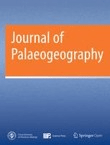
Journal of Palaeogeography-English
Bridging the Past and Present of Our PlanetThe Journal of Palaeogeography-English, published by Elsevier Science Inc, is a leading peer-reviewed open access journal that has been an essential resource for researchers since its establishment in 2012. With its focus on Earth-Surface Processes, Geography, Planning, Development, and Paleontology, the journal has secured a premier position in the academic community, recently achieving Q1 category rankings in multiple fields. The journal's current impact is reflected in its Scopus rankings, placing it in the top percentile of its categories, such as rank #12 in Paleontology and #39 in Earth-Surface Processes. With open access options, it facilitates wide dissemination and engagement with high-quality research, making significant contributions to our understanding of geographical and paleontological phenomena. As the journal converges towards 2024, it aims to continue fostering innovative research and interdisciplinary dialogue that will stimulate advancements in our knowledge of Earth’s past and present environments, appealing to a diverse audience of researchers, professionals, and students alike.

Swiss Journal of Palaeontology
Bridging Science and History in PaleontologySwiss Journal of Palaeontology, published by SPRINGER INT PUBL AG, stands as a leading platform for innovative research within the field of paleontology, contributing significantly to the understanding of Earth's historical life forms and their evolutionary pathways. With its ISSN 1664-2376 and E-ISSN 1664-2384, this journal has established a strong presence in academic circles, recognized as a Q1 journal in the category of Paleontology for 2023. Moreover, it ranks 20th out of 113 in the Earth and Planetary Sciences, securing an impressive 82nd percentile on Scopus, underscoring its influence and reach in the scientific community. The journal publishes cutting-edge research findings, theoretical advancements, and comprehensive reviews that span the globe, making it an essential resource for researchers, professionals, and students in the paleontological sciences. For those interested in contributing to and learning from the latest discoveries, the Swiss Journal of Palaeontology promises to be an invaluable addition to your academic library.